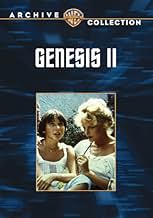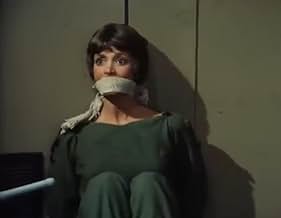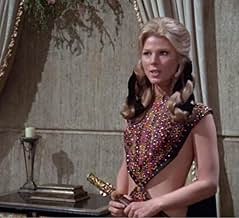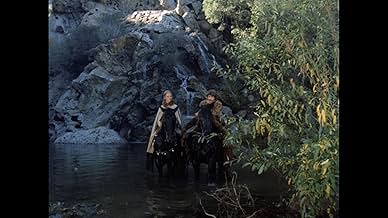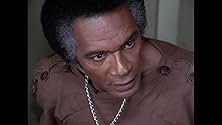PUNTUACIÓN EN IMDb
5,9/10
1,2 mil
TU PUNTUACIÓN
Un científico que ha sido preservado en animación suspendida se despierta y se encuentra en una sociedad primitiva del futuro.Un científico que ha sido preservado en animación suspendida se despierta y se encuentra en una sociedad primitiva del futuro.Un científico que ha sido preservado en animación suspendida se despierta y se encuentra en una sociedad primitiva del futuro.
- Dirección
- Guión
- Reparto principal
- Premios
- 1 nominación en total
Reseñas destacadas
The architecture referred to by another reviewer is actually the campus of the University of California at Riverside. It was filmed while I was a student there, during spring break so no students were around. While I loved the film, it was hard to suspend my disbelief looking at buildings I saw every day. We hoped it would take off as a series, since the campus got a paint job, some landscaping, and a few thousand dollars for our scholarship funds in exchange for letting them film. That "futuristic" architecture was mostly built in the early to mid 1960's. But it still has that "future" look. One of my fond memories of my undergraduate alma mater.
This film was made for television by Gene Roddenberry, under his NBC contract to develop new properties. Its provocative title referred to a new ecological beginning for Earth, after WWIII had been fought, 150-plus years had gone by, and the ravages of nuclear bombs had been all-but-obliterated. The series was turned down by network 'tsars', although scripts for it were authorized. Two more versions of the concept, including "Planet Earth" were produced as 'pilot' films for a series also. The storyline opens in the near future with Dylan Hunt working at a huge underground facility in Carlsbad Caverns. His project is served by magnetic-slide underground tunnels through which run high-speed trains. His subject is cryogenics, which is a technology with many potential uses from freezing men against the time their diseases will be cured to space-travel applications. Once he arrives on a sub-shuttle train back at the Project, he tries to help as something tectonic goes wrong; he is trapped in a life-sustaining cryogenic environment and sleeps for a century and a half. Those who eventually awaken him are people from the city of Pax, whose teams are combing the Earth contacting and influencing civilizations everywhere. She who finds him first is Lyra-A, a gorgeous mutant from the totalitarian city of Tyrania, set in the mountains near Phoenix; we learn later she is only pretending to be an escapee but really spying, learning what Pax's leaders are planning. Once fully restored, after her nursing and indoctrination of him(quite against Pax's leaders' policies), he sees classrooms and other rebuilding activities, and he meets the city's leaders, the Primuses; and of course they want him to join their effort. They are against the use of nuclear power, against killing for that matter; as a scientist, their attitude does not persuade him to adopt their radical solution to Earth's problems. Feeling he is only hearing one side of the story, he runs off with Lyra-A to see Tyrania. The problem with the mutant city, the abject fear and worship shown to her from the beginning by folk near a train departure station and once within the City, is disturbing to his assumptions. He finds out why the folk were afraid very soon. The city's leaders want him also, to help them repair the defective nuclear power station supplying their city. And they are willing to use the "stim"--an electronic pleasure-pain rod--a Roddenberry hangup-type device--that is the lineal descendant of the agonizer pain device used in the "Star Trek" episodes "Mirror, Mirror" and "Spocks' Brain" plus certain alien race Klingons' devices from the same TV series. Lyra-A begs him to join them; she loves him. But he must refuse and is sentenced to slavery, in the hopes he can be broken. The Pax Team he met earlier, three operatives, rescue him, and get him out of the infernal mutants' city. He goes off alone and, for his own reasons, blows up the nuclear plant. Then he returns to Pax, being willing to help them rebuild the world--to give it "Genesis II". The script for the project was written by Gene Roddenberry; the direction was well-done by John Llewellyn Moxey. Robert M. Anderson did the art direction, William Ware Theiss the costumes. "Star trek" veteran Gerald Perry Finnerman was its cinematographer. This is a beautiful production, using UC Riverside settings to augment its low budget; and its sub-shuttle trains are an excellent device by my standards--the magnetic equivalent of the "Star Trek" starship's less- believable transporter molecular disassembly machines. The mutants with their two navels are well done; the costumes, sets and exterior landscape shots are far-above-average for any film. Alex Cord lacks the classical speech to play the scientist Dylan Hunt, but he is attractive and manages to put the part across. Mariette Hartley is beautiful and effective as Lyra-A; in this period, she was US TV's busiest guest star and this part demonstrates why. The Primuses include Percy Rodrigues as Isaac Kimbridge, the leader, Titos Vandis as Yuloff, the Russian-born Security Chief, Roddenberry's wife Majel Barrett and Beulah Quo, plus Ted Cassidy as the white Indian Isaiah, Lynne Marta as a unisex follower of St. Sigmund Freud's Way, and Bill Strigloss as his Team partners, Harry Raybould as a villainous Tyranian, Robert Swan and Liam Dunn, among others. This is not a preachy film; it is a 1960s film within which the writer expected people to be able to understand the difference between ethical individuals conjoining their efforts in a society and those who prey on victims, the collectivists of any era, including the present. Without this categorical conceptual basis, of distinction, the film cannot be comprehended. So it is both a very-good low-budget entertainment and series concept, and also a litmus-paper test for objective thinking. Because, note--the scientist here rejected both total peace and total war--and he expected to persuade his new fellow citizens in Pax toward something between the democratic and republican extremes. In the meanwhile, there was world to be reclaimed. By the way, the series was probably rejected because it lacked a logical leading man as strong star and because in a long sequence in the original script, which I have read, Roddenberry described World War II (it was not allowed into the production; and Israel among others was on the wrong side of it; all TV network tsars could see was letters of protest; they seem to have missed the excellence of the conception entirely. This was to me as a writer and one who adapted elements of the story into a dramatic sci-fi novel the best of Gene Roddenberry's ideas for a series project.
One of my sci-fi/horror/fantasy reviews written 50 years ago: Directed by John Llewellyn Moxey; Produced by Gene Roddenberry, for Warner Brothers TV, broadcast by CBS-TV. Screenplay by Gene Roddenberry; Photography by Gerald Perry Finnerman; Edited by George Watters; Music by Harry Sukman; Makeup by Tom Burman. Starring: Alex Cord, Mariette Hartley, Ted Cassidy, Percy Rodrigues, Harvey Jason, Titos Vandis, Lynn Marta, Majel Barrett and Leon Askin.
Boring, stupid telefilm pilot in which Gene rips off the sillier and more irritating elements which did in his "Star Trek". Listless crud "actor" Cord is transported to a future existence via suspended animation, and the tired premise pits him with superior technological knowledge against fetishistic communities lapsed into primitive cultural patterns and barbarism.
Boring, stupid telefilm pilot in which Gene rips off the sillier and more irritating elements which did in his "Star Trek". Listless crud "actor" Cord is transported to a future existence via suspended animation, and the tired premise pits him with superior technological knowledge against fetishistic communities lapsed into primitive cultural patterns and barbarism.
An underrated film about social doom, typical of the 70s for this genre, yet permanently relevant. The budget was not huge, but the atmosphere is there. Mariette Hartley gives a beautifully subtle performance, and is perhaps in her most physically attractive and visually memorable role.
This was supposed to be a possible series that combines several themes from Star Trek. It takes place on Earth after a nuclear war, and some of the inhabitants faired differently depending on the area. This is similar to the Omega Glory. Some of the people have adapted and evolved into stronger humans as in Space Seed. Some lived under ground like in Spocks Brain. As in Star Trek, this is a small morality play.
The main character is a man from the 20th is awakened, and he has lost scientific knowledge needed by everyone. It found by a group called Pax. They want to end violence on Earth and restore it. They get around the earth in a high speed underground train called a "sub-shuttle." This survived the war. You can clearly guess that in each episode they would visit a different part of Earth in the same way Star Trek visited other planets.
This was not turned into a series, but was reworked into another pilot starring John Saxon. He was more of a Captain Kirk like lead.
Either version would have made a good series.
The main character is a man from the 20th is awakened, and he has lost scientific knowledge needed by everyone. It found by a group called Pax. They want to end violence on Earth and restore it. They get around the earth in a high speed underground train called a "sub-shuttle." This survived the war. You can clearly guess that in each episode they would visit a different part of Earth in the same way Star Trek visited other planets.
This was not turned into a series, but was reworked into another pilot starring John Saxon. He was more of a Captain Kirk like lead.
Either version would have made a good series.
¿Sabías que...?
- CuriosidadesThe science fiction justification for Lyra-a (Mariette Hartley) and other Tyranians having two navels is that they have redundant circulatory systems. However, Gene Roddenberry joked that the behind-the-scenes reason was to make up for the covered navels mandated by network and studio censors during the production of Star Trek: La serie original (1966).
- PifiasEither too much has changed or not enough time has passed for given changes. the landscape outside the caverns should have ruins. 154 years isn't enough time to clear it up like that. There are no signs of nuclear damage and the city of Terrania couldn't have been made that magnificent that quickly. Terranians have to evolve first and then become able to build such a showpiece of a city.
- ConexionesFollowed by Planeta Terra (1974)
Selecciones populares
Inicia sesión para calificar y añadir a tu lista para recibir recomendaciones personalizadas
Detalles
Contribuir a esta página
Sugerir un cambio o añadir el contenido que falta



